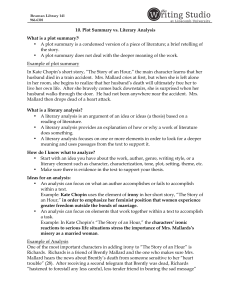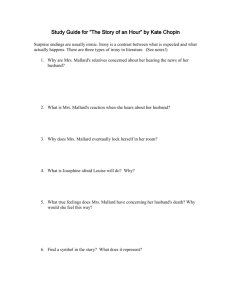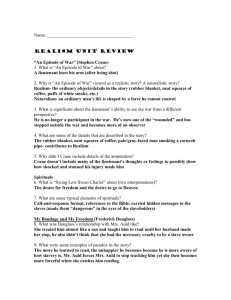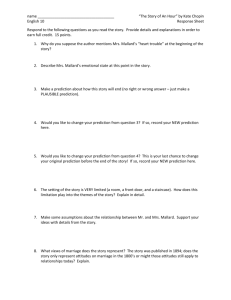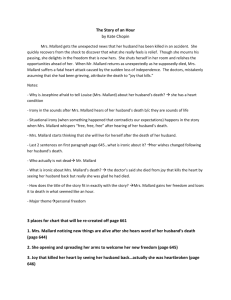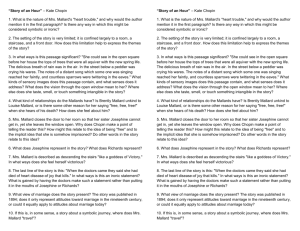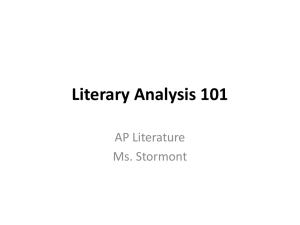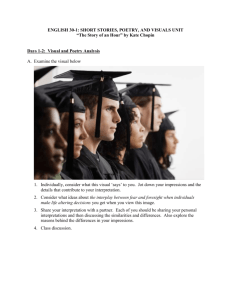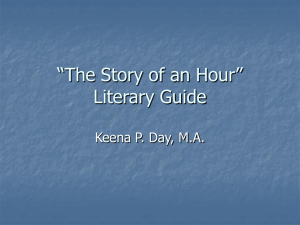UNIT 2 LESSON 6.doc
advertisement
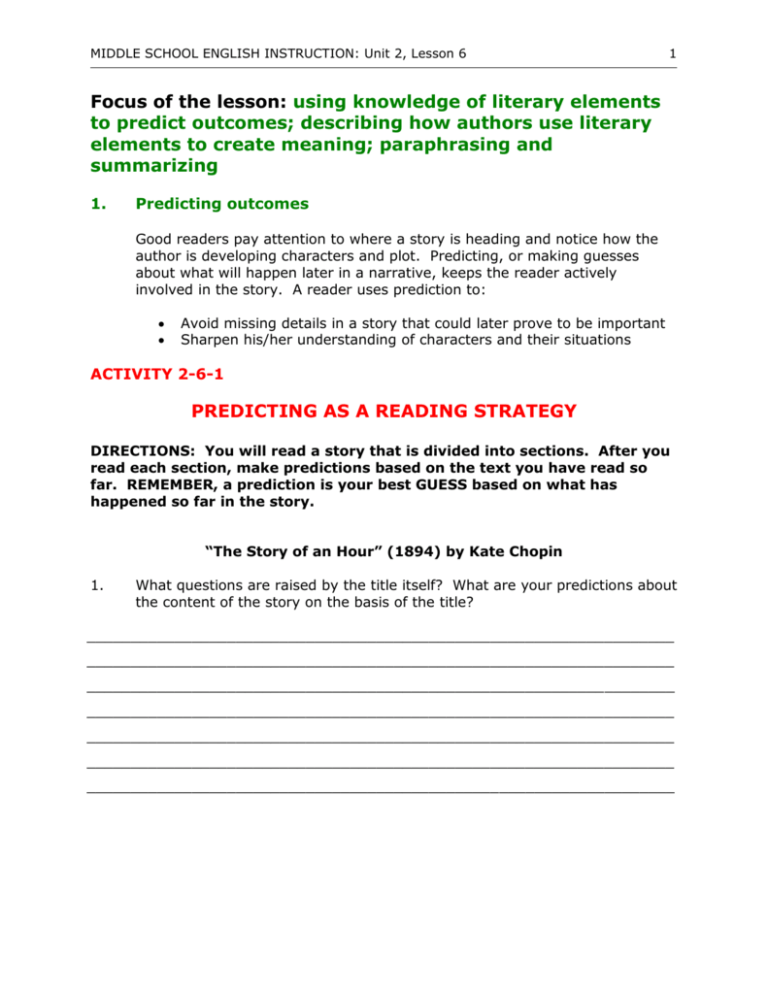
MIDDLE SCHOOL ENGLISH INSTRUCTION: Unit 2, Lesson 6 1 Focus of the lesson: using knowledge of literary elements to predict outcomes; describing how authors use literary elements to create meaning; paraphrasing and summarizing 1. Predicting outcomes Good readers pay attention to where a story is heading and notice how the author is developing characters and plot. Predicting, or making guesses about what will happen later in a narrative, keeps the reader actively involved in the story. A reader uses prediction to: Avoid missing details in a story that could later prove to be important Sharpen his/her understanding of characters and their situations ACTIVITY 2-6-1 PREDICTING AS A READING STRATEGY DIRECTIONS: You will read a story that is divided into sections. After you read each section, make predictions based on the text you have read so far. REMEMBER, a prediction is your best GUESS based on what has happened so far in the story. “The Story of an Hour” (1894) by Kate Chopin 1. What questions are raised by the title itself? What are your predictions about the content of the story on the basis of the title? ___________________________________________________________________ ___________________________________________________________________ ___________________________________________________________________ ___________________________________________________________________ ___________________________________________________________________ ___________________________________________________________________ ___________________________________________________________________ MIDDLE SCHOOL ENGLISH INSTRUCTION: Unit 2, Lesson 6 2 Installment 1 Knowing that Mrs. Mallard was afflicted with a heart trouble, great care was taken to break to her as gently as possible the news of her husband's death. 2. Predict how Mrs. Mallard’s husband died. ___________________________________________________________________ ___________________________________________________________________ ___________________________________________________________________ ___________________________________________________________________ ___________________________________________________________________ ___________________________________________________________________ ___________________________________________________________________ 3. Predict who will tell Mrs. Mallard the news of her husband’s death. Predict why it is important that certain people tell her the news of her husband’s death. ___________________________________________________________________ ___________________________________________________________________ ___________________________________________________________________ ___________________________________________________________________ ___________________________________________________________________ ___________________________________________________________________ ___________________________________________________________________ Installment 2 It was her sister Josephine who told her, in broken sentences; veiled hints that revealed in half concealing. Her husband's friend Richards was there, too, near her. It was he who had been in the newspaper office when intelligence (news) of the railroad disaster was received, with Brently Mallard's name leading the list of "killed." He had only taken the time to assure himself of its truth by a second telegram, and had hastened to forestall (prevent) any less careful, less tender friend in bearing the sad message. She did not hear the story as many women have heard the same, with a paralyzed inability to accept its significance. She wept at once, with sudden, wild abandonment (lack of control), in her sister's arms. When the storm of grief had spent itself she went away to her room alone. She would have no one follow her. MIDDLE SCHOOL ENGLISH INSTRUCTION: Unit 2, Lesson 6 4. 3 What did Mrs. Mallard do once she went to her room after hearing the news of her husband’s death? ___________________________________________________________________ ___________________________________________________________________ ___________________________________________________________________ ___________________________________________________________________ ___________________________________________________________________ ___________________________________________________________________ ___________________________________________________________________ Installment 3 There stood, facing the open window, a comfortable, roomy armchair. Into this she sank, pressed down by a physical exhaustion that haunted her body and seemed to reach into her soul. She could see in the open square before her house the tops of trees that were all aquiver with the new spring life. The delicious breath of rain was in the air. In the street below a peddler was crying his wares. The notes of a distant song which some one was singing reached her faintly, and countless sparrows were twittering in the eaves. There were patches of blue sky showing here and there through the clouds that had met and piled one above the other in the west facing her window. She sat with her head thrown back upon the cushion of the chair, quite motionless, except when a sob came up into her throat and shook her, as a child who has cried itself to sleep continues to sob in its dreams. She was young, with a fair, calm face, whose lines bespoke repression (hinted at strong self-control) and even a certain strength. But now there was a dull stare in her eyes, whose gaze was fixed away off yonder on one of those patches of blue sky. It was not a glance of reflection, but rather indicated a suspension of intelligent thought. There was something coming to her and she was waiting for it, fearfully. What was it? She did not know; it was too subtle and elusive to name. But she felt it, creeping out of the sky, reaching toward her through the sounds, the scents, the color that filled the air. MIDDLE SCHOOL ENGLISH INSTRUCTION: Unit 2, Lesson 6 5. 4 For what was Mrs. Mallard waiting to come to her? ___________________________________________________________________ ___________________________________________________________________ ___________________________________________________________________ ___________________________________________________________________ ___________________________________________________________________ ___________________________________________________________________ ___________________________________________________________________ Installment 4 Now her bosom rose and fell tumultuously (wildly). She was beginning to recognize this thing that was approaching to possess her, and she was striving to beat it back with her will--as powerless as her two white slender hands would have been. When she abandoned herself, a little whispered word escaped her slightly parted lips. She said it over and over under her breath: "free, free, free!" The vacant stare and the look of terror that had followed it went from her eyes. They stayed keen and bright. Her pulses beat fast, and the coursing blood warmed and relaxed every inch of her body. She did not stop to ask if it were or were not a monstrous joy that held her. A clear and exalted perception enabled her to dismiss the suggestion as trivial. She knew that she would weep again when she saw the kind, tender hands folded in death; the face that had never looked save with love upon her, fixed and gray and dead. But she saw beyond that bitter moment a long procession of years to come that would belong to her absolutely. And she opened and spread her arms out to them in welcome. 6. What new issue does the last paragraph in Installment 4 introduce? ___________________________________________________________________ ___________________________________________________________________ ___________________________________________________________________ ___________________________________________________________________ MIDDLE SCHOOL ENGLISH INSTRUCTION: Unit 2, Lesson 6 7. 5 What do you think will happen to Mrs. Mallard at the end of the story? ___________________________________________________________________ ___________________________________________________________________ Installment 5 ___________________________________________________________________ There would be no one to live for during those coming years; she would live ___________________________________________________________________ for herself. There would be no powerful will bending hers in that blind persistence with which men and women believe they have a right to impose a private will upon a fellow-creature. A kind intention or a cruel intention made the act seem no less a crime as she looked upon it in that brief moment of illumination (clear understanding). And yet she had loved him--sometimes. Often she had not. What did it matter! What could love, the unsolved mystery, count for in face of this possession of self-assertion which she suddenly recognized as the strongest impulse of her being! "Free! Body and soul free!" she kept whispering. Josephine was kneeling before the closed door with her lips to the keyhole, imploring for admission. "Louise, open the door! I beg, open the door--you will make yourself ill. What are you doing Louise? For heaven's sake open the door." "Go away. I am not making myself ill." No; she was drinking in a very elixir (miraculous substance) of life through that open window. Her fancy was running riot along those days ahead of her. Spring days, and summer days, and all sorts of days that would be her own. She breathed a quick prayer that life might be long. It was only yesterday she had thought with a shudder that life might be long. She arose at length and opened the door to her sister's importunities (begging). There was a feverish triumph in her eyes, and she carried herself unwittingly like a goddess of Victory. She clasped her sister's waist, and together they descended the stairs. Richards stood waiting for them at the bottom. Someone was opening the front door with a latchkey. It was Brently Mallard who entered, a little travel-stained, composedly carrying his grip-sack and umbrella. He had been far from the scene of accident, and did not even know there had been one. He stood amazed at Josephine's piercing cry; at Richards' quick motion to screen him from the view of his wife. But Richards was too late. When the doctors came they said she had died of heart disease-- of joy that kills. MIDDLE SCHOOL ENGLISH INSTRUCTION: Unit 2, Lesson 6 6 How accurate were your predictions? Did you use information in the story to make your “best guess”? ___________________________________________________________ ___________________________________________________________ 2. Describing how authors use literary elements to create meaning In previous lessons, you have learned about the literary elements of plot, character, conflict, point of view, and tone. Critical reading skills enable a reader to apply that knowledge to a narrative to analyze the author’s craft in the construction of the story. To complete this lesson, you will be completing graphic organizers to demonstrate how the literary elements that are listed above (plot, character, conflict, point of view, and tone) function in the literary selection you are reading. ACTIVITY 2-6-2 COMPLETE THE ACTIVITY ON ANALYZING LITERARY ELEMENTS, WHICH CAN BE FOUND IN THE ACTIVITIES FOLDER. MIDDLE SCHOOL ENGLISH INSTRUCTION: Unit 2, Lesson 6 3. 7 PARAPHRASING AND SUMMARIZING To paraphrase is to restate a text or a passage in another form or other words, often to clarify meaning. To summarize is to reduce a text to its main points. A paraphrase attempts to capture the “flavor” of the original text, while a summary attempts to capture only the major ideas contained in the text. EXAMPLES: Original text: from “The Black Cat” by Edgar Allan Poe FOR the most wild, yet most homely narrative which I am about to pen, I neither expect nor solicit belief. Mad indeed would I be to expect it, in a case where my very senses reject their own evidence. Yet, mad am I not -- and very surely do I not dream. But to-morrow I die, and to-day I would unburthen my soul. My immediate purpose is to place before the world, plainly, succinctly, and without comment, a series of mere household events. In their consequences, these events have terrified -- have tortured -- have destroyed me. Yet I will not attempt to expound them. To me, they have presented little but Horror -- to many they will seem less terrible than barroques. Hereafter, perhaps, some intellect may be found which will reduce my phantasm to the common-place -- some intellect more calm, more logical, and far less excitable than my own, which will perceive, in the circumstances I detail with awe, nothing more than an ordinary succession of very natural causes and effects. Paraphrase: For the strange, yet simple story that I am about to write, I neither anticipate nor ask for belief. I would be crazy to hope for it in this instance where I can hardly believe my own senses. But I am not crazy, and I’m not dreaming. Because I may die at any time, I need to get this off my chest right now. My goal is to let everyone know, simply, briefly, and without elaboration, a series of events that happened in my household. The consequences of these events have nearly killed me. But I will not try to describe them in detail. Although they have terrified me, many people would find them less terrible than scary pictures. Indeed, at some later time someone calmer and more rational than I may be able to demonstrate that the events that seem to me so horrifyingly eerie can be explained calmly and logically as just an ordinary sequence of natural causes and effects. MIDDLE SCHOOL ENGLISH INSTRUCTION: Unit 2, Lesson 6 Summary: In this passage from Poe’s short story “The Black Cat,” the narrator seems to have been traumatized by some fantastic events that he feels the need to share with the world. Although he states that the story he will tell is simple, he makes clear that what has happened has tortured and nearly destroyed him. He seems to doubt his own senses, admitting that others might perceive the events as less frightening than a strangely weird and fantastic picture and that a calmer, more rational person than himself might be able to find a logical explanation for the occurrences he views as horrifyingly unnatural. ACTIVITY 2-6-3 ACTIVITY: PARAPHRASING AND SUMMARIZING DIRECTIONS: Write both a paraphrase and a summary of the following passage from the Bible. Luke 10: 30-37 (King James Version) 29 . . . A certain lawyer said unto Jesus, “Who is my neighbor?” 30 And Jesus answering said, A certain man went down from Jerusalem to Jericho, and fell among thieves, which stripped him of his raiment, and wounded him, and departed, leaving him half dead. 31 And by chance there came down a certain priest that way: and when he saw him, he passed by on the other side. 32 And likewise a Levite, when he was at the place, came and looked on him, and passed by on the other side. 33 But a certain Samaritan, as he journeyed, came where he was: and when he saw him, he had compassion on him, 34 And went to him, and bound up his wounds, pouring in oil and wine, and set him on his own beast, and brought him to an inn, and took care of him. 35 And on the morrow when he departed, he took out two pence, and gave them to the host, and said unto him, Take care of him; and whatsoever thou spendest more, when I come again, I will repay thee. 36 Which now of these three, thinkest thou, was neighbor unto him that fell among the thieves? 37And he (the lawyer) said, He that shewed mercy on him. Then said Jesus unto him, Go, and do thou likewise. 8
